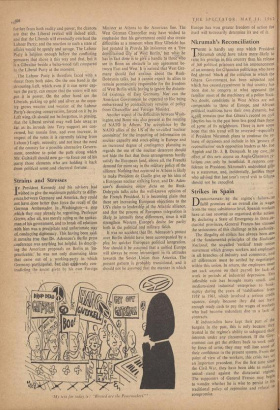ISILLUSIONED by the regime ' s failure.. 10 fulfil. promises of an
overall rise in wages from,the mere subsistence level, Spanish workers have at last. resorted to organised, strike action. By declaring a State of Emergency in threcain- dustrial provinces,. General Franco ,has stressed the seriousness of this challenge to his authority. The illegality of. strikes has always been ,..one of. the fundamental principles of the Sindic‘440 National, the so-called 'vertical' . trade union movement which groups workers and.employers in all branches •of 'industry and commerce,. 'and all differences must be settled by negotiapiOn within this union. In return, the employers must not sack anyone on their payroll for lack of work in periods of industrial depression. This inflexible rule has brought many small- and medium-sized industrial enterprises to bank- ruptcy during the years of 'stabilisation' from 1958' to 1961, which involved a serious credit squeeze, simply because they did not have enough ready cash to pay the wages of workers who had become redundant due to a lack of contracts.
If industrialists have kept their part of the bargain in the past, this is only because th'Y trusted in the regime's ability to safeguard their interests under any circumstances. If the GO- ernment can get the strikers back to work only' by force of arms, they may well lose some or their confidence in the present system. From the point of view of the workers, this crisis has set an important precedent. For the first time since the Civil War, they have been able to make 3 united • stand against the dictatorial reginie. The supporters of General Franco may begin to wonder whether he is wise to persist in his traditional policy of repression and refusal to compromise.


































 Previous page
Previous page